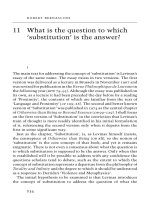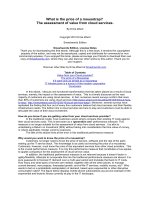What is the price of a mousetrap? The assessment of value from cloud services pptx
Bạn đang xem bản rút gọn của tài liệu. Xem và tải ngay bản đầy đủ của tài liệu tại đây (98.92 KB, 3 trang )
What is the price of a mousetrap?
The assessment of value from cloud services.
By Ernie Zibert
Copyright 2012 Ernie Zibert
Smashwords Edition
Smashwords Edition, License Notes
Thank you for downloading this free ebook. Although this is a free book, it remains the copyrighted
property of the author, and may not be reproduced, copied and distributed for commercial or non-
commercial purposes. If you enjoyed this book, please encourage your friends to download their own
copy at Smashwords.com, where they can also discover other works by this author. Thank you for
your support.
Discover other titles by Ernie Zibert at Smashwords.com.
Table of Contents
Value from your Cloud provider?
The price of a Mousetrap
If it were only as simple as a mousetrap
IT Infrastructure is a tumour of the modern corporation
Conclusion
In this ebook, I discuss one functional transformation that has taken placed as a result of cloud
services, namely; the impact on the assessment of value. This is a timely discourse as the vast
majority of customers are using cloud services. In fact, numerous recent surveys confirm that more
than 80% of customers are using cloud services ( />to-stay/, Moreover, several surveys have
replicated the finding that four out of every five customers believe that cloud services met their flexible
infrastructure needs. The bottom line is cloud services are here to stay and customers must be able to
articulate the value of their cloud investment.
How do you know if you are getting value from your cloud services provider?
In the traditional model, most customers would simply compare their existing IT costs against
their cloud services costs. This is best seen as a ‘generation one’ performance measure. This
measure is no longer suitable for the assessment of value from cloud services. It is akin to
undertaking a Return on Investment (ROI) without taking into consideration the time value of money,
or where applicable, foreign currency exposure.
The title of this ebook hints at the error in this traditional performance measure.
Why would you want to know the price of a mousetrap?
Customers no longer need to know the price of servers, software and the rest of the parts
making up the IT service stack. This knowledge is as useful as knowing the price of a mousetrap.
Customers, however, must know the price of the equivalent services from other cloud providers. This
is the crucial performance measure. It is only this performance measure that constitutes a true apples-
to-apples comparison for the assessment of cloud service value.
In addition, the traditional performance measure is not relevant because it doesn’t factor in
agility/flexibility. Attempts to incorporate this into the traditional performance measure are absurd. It is
pure guesswork to forecast IT demand over a multi-year period and translate that back to IT costs.
How many and what types of servers are needed, together with all the other pieces, to manage
current demand, new projects, forecasted growth, end-of-life IT services, mobility moves, etc? Who
wants to bet on a probabilistic extrapolation of demand, based upon exponential or other disruptive
consumption rates? The figure below displays mobile phone subscriptions as just one example of the
exponential and tectonic forces currently at play in the IT landscape.
An example of the disruptive consumption rates is shown in the chart below. This chart
presents the forecasted market growth-rate for cloud services (Forrester, 2011 -
/>It is simply not credible to use yesterday’s IT investment to compare against tomorrow’s IT
cloud solution. The latter has the additional attributes of being available anywhere, at anytime and on
any device.
If it was only a simple as a mouse-trap.
The complication is that for most customers they already have an IT investment. So the
assessment of cloud value will involve a comparison between what other IT investments are required
versus the equivalent cloud service costs. A very obvious example pertains to development/test
environments (sandpits). If you need to invest in these environments, that cost might be greater than
the equivalent cloud based platform-as-a-service offering.
IT Infrastructure is a tumour of the modern corporation.
IT Infrastructure is a tumour of the modern corporation. It forces asset specificity; it limits
flexibility, agility, and availability. Most customers have this tumour, and they should actively avoid
growing it.
In another ebook, I explain a new business paradigm, Augmented Managed Services (AMS).
This is yet another approach businesses should use when assessing cloud value. AMS is the
paradigm where a predefined level of demand is managed internally and the remainder augmented
with cloud services. The apothegm is ‘Own the base and rent the peak’.
Conclusion
The customer’s overall cloud health starts with an assessment of value. The assessment of
value of cloud services can only include a comparison against other cloud providers. The comparison
of cost between traditional IT investment and cloud services must be avoided. Such a comparison is
not even apples-to-oranges rather fruits-to-vegies.
About the author:
Ernie Zibert is an influential IT Management Executive with 20+ years of international
achievement in leveraging technology and strategic partnerships to drive growth, performance,
flexibility, and customer satisfaction. A proven change agent, capable of orchestrating transformative
business strategy. Champions innovation with a focus on developing flexible, scalable solutions for
customer and organisational problems. Diverse experience across government, communications and
media, and finance industries. World class financial, relationship and commercial management of IT
sourcing relationships. Respected leader in highly-matrixed global corporate environments and in the
Australian IT Services community.
Other titles by Ernie Zibert:
Discover other titles by Ernie Zibert at Smashwords.com.
The Science of Sourcing Governance
What’s the difference between a million and a billion dollar IT sourcing deal?
Ordering IT Services: Would you like CHIPS with that?
Sourcing's Three Fates
The IT Outsourcing RFP COW is too FAT
AMS - The next stage in the evolution of IT Outsourcing
Outsourcing’s Two Evils
Apply CREAMS to your IT Outsourcing pain
Sourcing’s Five Critical Governance Processes
The Five Dimensions of Sourcing Value
The relationship between the five dimensions of sourcing value
Connect with Me Online:
My blog: strategicsourcingblog.blogspot.com
For more information, contact Ernie Zibert at
Thanks go to Mohandass Ayyappath for his insightful comments and editing.









